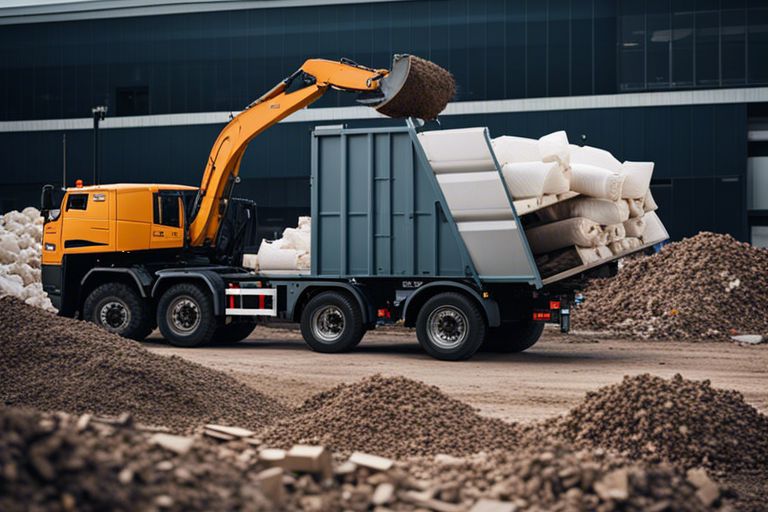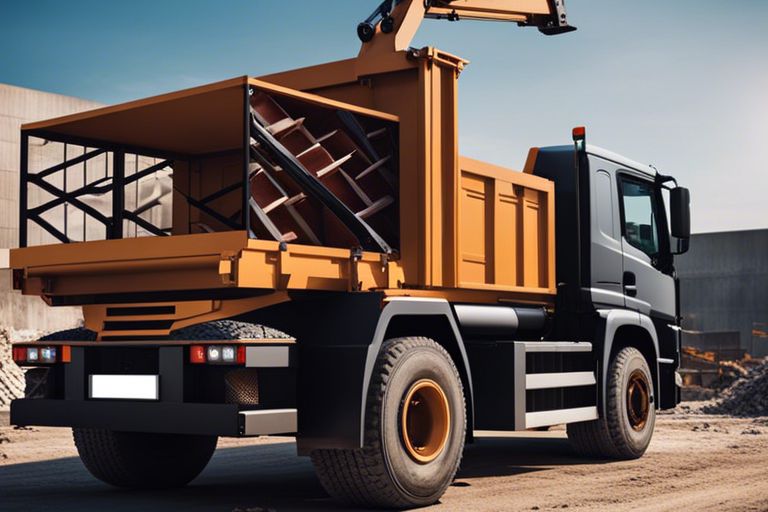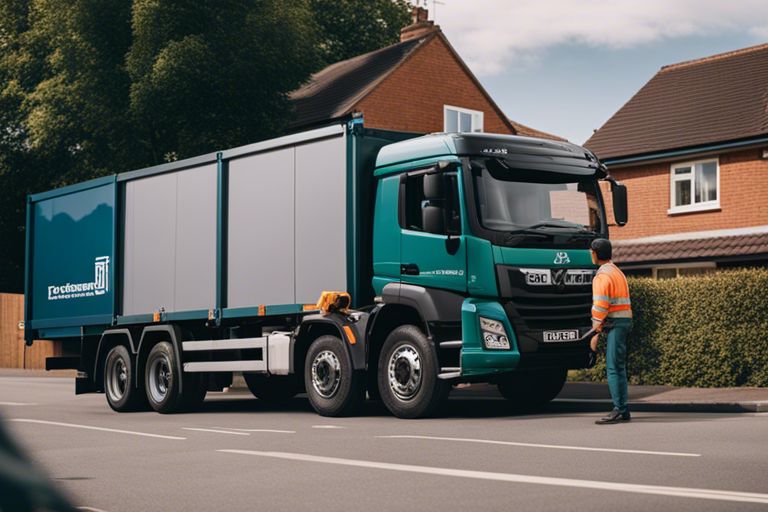Demolition projects, while necessary, can pose significant risks to the safety of workers and the public. It is crucial to implement strict safety measures to prevent accidents and ensure the smooth execution of the project. From thorough site assessments to the proper use of protective equipment, there are various essential precautions that must be taken to mitigate potential hazards. For more detailed safety guidelines, you can also refer to our related article on 10 Tips for Staying Safe on a Demolition Site.
Key Takeaways:
- Proper Planning: Before commencing a demolition project, it is crucial to carry out comprehensive planning to identify potential hazards, establish safety measures, and ensure compliance with regulations.
- Effective Communication: Clear communication among all parties involved, including workers, contractors, and local authorities, is essential to maintain a safe working environment and minimise the risk of accidents.
- Continuous Monitoring: Regular monitoring and review of safety measures throughout the demolition project are necessary to address any emerging risks and make necessary adjustments to protect workers and the public.
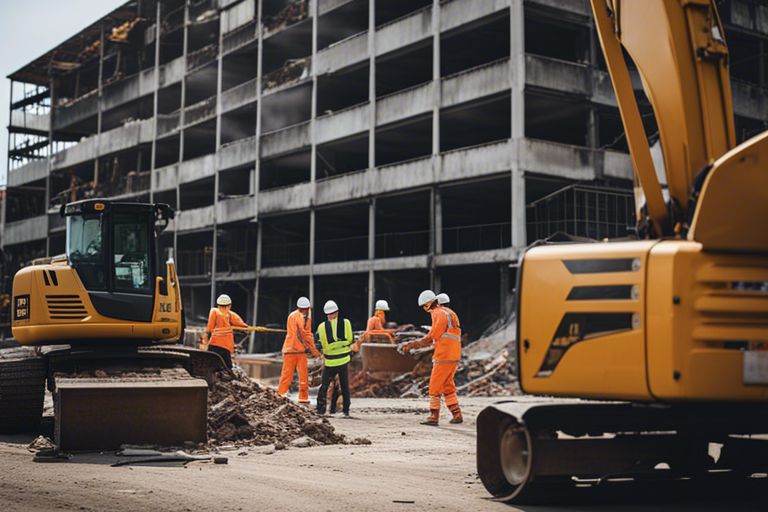
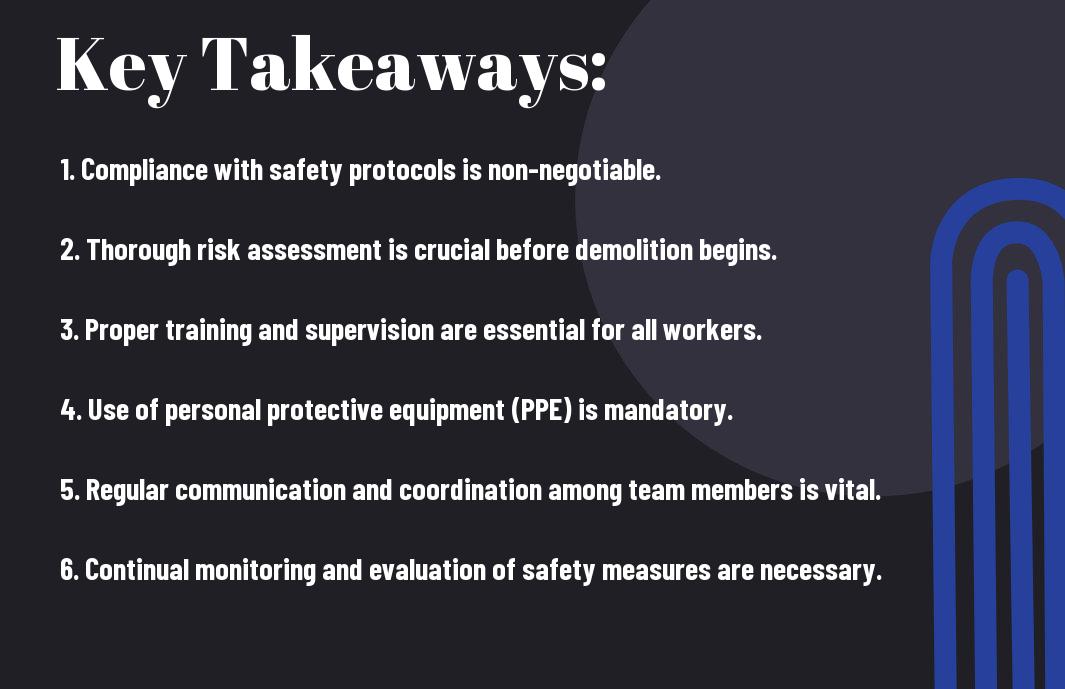
Pre-Demolition Safety Planning
Before any demolition project begins, it is crucial to carefully plan for the safety of all workers, contractors, and the public. Pre-demolition safety planning involves a thorough evaluation of potential hazards and the creation of a comprehensive safety plan to mitigate risks.
Risk Assessment and Hazard Analysis
Before the demolition process begins, it is essential to conduct a detailed risk assessment and hazard analysis of the site. This involves identifying potential hazards such as structural instability, presence of hazardous materials, and environmental risks. Understanding these risks is crucial in determining the necessary safety measures that need to be implemented during the demolition project.
Creation of a Safety Plan
Based on the findings of the risk assessment and hazard analysis, a comprehensive safety plan must be developed. This plan should outline the safety procedures, protocols, and protective measures that need to be implemented throughout the demolition project. It should also include emergency response and evacuation plans, as well as the designation of a qualified safety manager to oversee the implementation of the safety plan.
It is imperative that the safety plan is communicated effectively to all workers and contractors involved in the demolition project. Regular training and safety briefings should be conducted to ensure that everyone is aware of the potential risks and the measures in place to mitigate them.
Protective Measures and Equipment
When it comes to demolition projects, it’s crucial to implement the necessary protective measures and use the appropriate equipment to ensure the safety of everyone involved. For a detailed overview of safety measures for demolition, you can refer to What Are the Safety Measures for Demolition?
Personal Protective Equipment (PPE)
Personal Protective Equipment (PPE) plays a vital role in safeguarding the health and well-being of workers on demolition sites. This includes but is not limited to helmets, safety goggles, ear protection, gloves, and high-visibility clothing. It is essential for all workers to wear the appropriate PPE at all times to prevent injuries from falling debris, dust, or hazardous materials.
Furthermore, respiratory protection is crucial in demolition projects due to the potential exposure to airborne particles and contaminants. Properly fitted respiratory masks or respirators must be worn to minimise the risk of inhalation of harmful substances.
Machinery and Equipment Safety
Heavy machinery and equipment used in demolition projects present numerous hazards if not operated and maintained correctly. Workers must receive thorough training on the operation of these machines to ensure safety and prevent accidents. Machinery such as excavators, bulldozers, and wrecking balls require skilled operators to carry out the work safely.
Regular inspection and maintenance of all machinery and equipment is imperative to identify and address any potential mechanical issues promptly. It is also essential to establish exclusion zones to prevent unauthorised personnel from entering areas where machinery is in operation.
Additional consideration should be given to the proper handling and disposal of hazardous materials, such as asbestos or lead-based paint, which may be encountered during demolition. Specialised training and equipment are required to manage these situations safely.
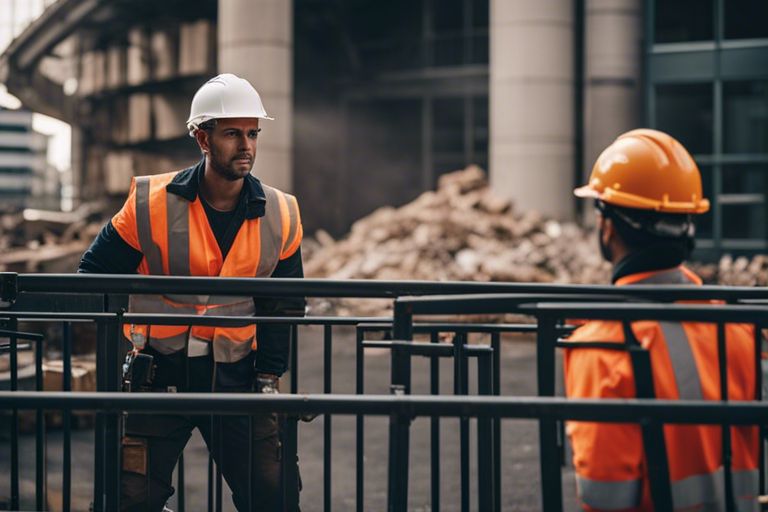
Operational Safety Procedures
When it comes to demolition projects, operational safety procedures are of utmost importance to ensure the well-being of all individuals involved in the project. These procedures are designed to mitigate risks and prevent accidents during the demolition process. It is crucial for all demolition teams to strictly adhere to these safety procedures to maintain a safe working environment.
Worker Training and Competence
Worker training and competence are essential elements in ensuring the safety of a demolition project. All workers involved in demolition must undergo comprehensive training to understand the potential hazards and risks associated with the demolition process. It is imperative that workers are competent and equipped with the necessary skills to handle demolition equipment and machinery. Regular training sessions and assessments should be carried out to ensure that workers are up to date with the latest safety measures and protocols.
Demolition Techniques and Best Practices
Demolition techniques and best practices play a crucial role in ensuring the success and safety of a demolition project. Utilising the correct demolition techniques can significantly reduce the risk of accidents and structural failures during the process. It is vital for demolition teams to follow industry best practices and utilise the most efficient and safe techniques when carrying out demolition operations.
Understanding the specific requirements of each demolition project and implementing appropriate techniques, such as selective demolition or implosion, can facilitate a smoother and safer demolition process. Additionally, adherence to best practices such as structural assessment and planning, waste management, and environmental considerations are fundamental in ensuring a successful and safe demolition operation.
Emergency Preparedness and Response
When it comes to demolition projects, ensuring emergency preparedness and an effective response plan is crucial to safeguarding the health and safety of all personnel involved. In the event of an emergency, having well-established protocols and procedures can make all the difference in mitigating the potential risks and ensuring a swift and efficient response.
Establishing Emergency Protocols
It is imperative to establish clear and comprehensive emergency protocols before commencing any demolition project. This includes conducting a thorough risk assessment to identify potential hazards and implementing appropriate control measures. Additionally, all personnel must be adequately trained in emergency procedures and equipped with the necessary tools and protective gear to effectively respond to any unforeseen incidents. Regular drills and rehearsals should be carried out to ensure everyone is familiar with the emergency protocols and can act swiftly and confidently in the event of an emergency.
Incident Reporting and Investigation
Following any emergency or incident on-site, it is essential to have a well-defined process for incident reporting and investigation. All incidents, regardless of severity, must be promptly reported to the designated personnel and thoroughly investigated to determine the root cause and prevent future occurrences. This involves documenting all relevant details, including the nature of the incident, individuals involved, and any contributing factors. It is imperative to conduct a detailed analysis to identify any shortcomings in the existing safety measures and make necessary improvements to prevent similar incidents from happening again.
Incident reporting and investigation plays a critical role in maintaining a safe working environment and continuously improving safety standards on demolition projects.
Essential Safety Measures for Demolition Projects
In conclusion, it is crucial for all parties involved in demolition projects to prioritise safety measures to prevent accidents and injuries. By adhering to the required safety protocols, such as conducting thorough risk assessments, using appropriate protective gear, and implementing effective communication among the team, the likelihood of incidents can be significantly reduced. Furthermore, continuous monitoring and regular training of personnel will ensure that safety remains a top priority throughout the duration of the project. It is imperative for project managers, contractors, and workers to understand their roles in maintaining safety standards and take all necessary precautions to mitigate risks. Ultimately, the implementation of essential safety measures is not only a legal obligation but also an ethical responsibility to safeguard the well-being of all individuals involved in demolition projects.
FAQ
Q: What are the essential safety measures for demolition projects?
A: The essential safety measures for demolition projects include proper planning, thorough risk assessment, use of personal protective equipment, securing the site perimeter, and implementing clear communication and emergency procedures.
Q: Why is proper planning important for demolition projects?
A: Proper planning is crucial for demolition projects to identify potential hazards, develop safety protocols, allocate resources effectively, and ensure smooth execution of the project while prioritising the safety of workers and the public.
Q: What is involved in a thorough risk assessment for demolition projects?
A: A thorough risk assessment for demolition projects involves identifying potential hazards such as structural instability, hazardous materials, environmental impacts, and nearby structures, and implementing measures to mitigate these risks.
Q: What personal protective equipment is necessary for demolition projects?
A: Personal protective equipment (PPE) for demolition projects includes hard hats, safety goggles, hearing protection, respiratory equipment, high-visibility clothing, and appropriate footwear to protect workers from potential hazards at the site.
Q: How can the site perimeter be secured for a demolition project?
A: The site perimeter for a demolition project can be secured using fencing, barriers, warning signs, and designated entry and exit points to restrict access and ensure the safety of workers, the public, and neighboring properties.


